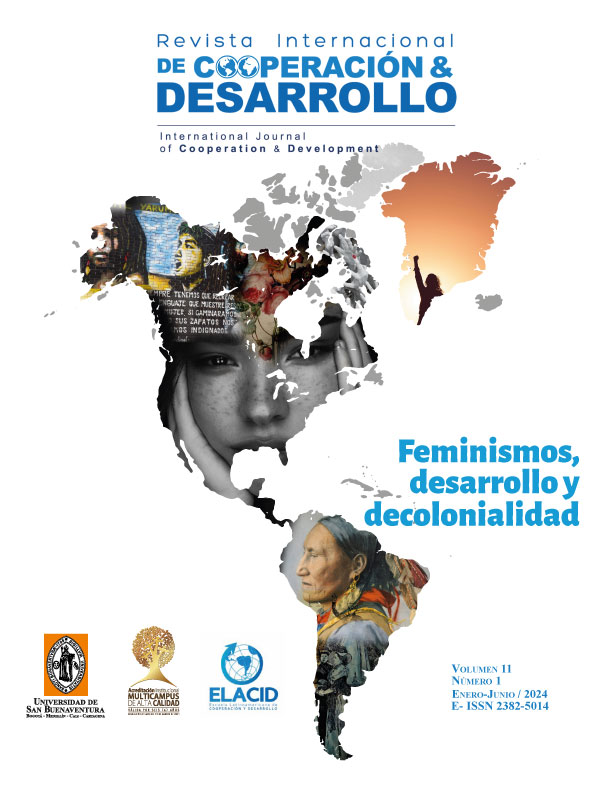INTERNATIONAL JOURNAL OF COOPERATION AND DEVELOPMENT
Assignment of Rights
Authorization for reproduction, publication, communication and distribution of a literary, artistic or scientific
Work.
I , ____________________________________________, author of the book and / or article , of legal age , resident of the city of _________________ , identified with citizenship / passport n° ______________________ issued on _______________________, in exercise of his physical and mental faculties , part henceforth be called the AUTHOR , supports the following authorization to the reproduction, publication, communication and distribution of a work, perform the following terms:
1. Regardless of current legal regulations due to the linking of the parties to this contract, and any kind of legal presumption , the parties agree that the AUTHOR authorize ( name of the publisher ) to reproduce , publish , communicate and distribute the material referred to in the International Journal of Cooperation and Development of the University of San Buenaventura.
2. Such authorization lies in particular on the copyright of the work, by any means known or unknown, publication of the work, distribution of the work , either directly or through third parties for purely educational purposes.
3. AUTHOR agrees to report and declare the existence of this authorization and to preserve the right of the International Journal of Cooperation and Development of the first publication of the work.
4. AUTHOR declares that the article is original and that it is his sole creation, no impediment of any kind exist for the authorization he is doing, besides being responsible for any action claim, plagiarism or other type of claim that might arise about .
5. Such permission is free of charge.
6. Moral copyright in the article are solely the AUTHOR and the University of San Buenaventura expressly agrees to recognize and respect them rigorously.
The Author and / or AUTHORS
SIGNATURE
Abstract
This research reflects a dialogical process with the women of Guainía (Colombia), with the intention of answering the question: How is the ‘Thinking-feeling’ of the territory expressed by women in the communities of La Ceiba and Remanso? To do this, a methodological approach from the Anthropology of Art is used, along with techniques such as poetic documentation, dialogical ethnography, artistic expression, and audiovisual text.
The theoretical axes include the Studies of the Pluriverse (EPV) and the ontological turn proposed by Arturo Escobar, complemented by the contributions of Intuitive Feminism by María Galindo.
Two co-created products/indexes were developed, articulating the ‘Thinking-feeling’ of the territory in a documentary video and a magazine with poetic documentation. In this way, it was possible to intertwine and express the relational, political, and design ontology maintained by women in the communities of La Ceiba and Remanso (Guainía), demonstrating the practices through which they connect with the territory, through the cultivation and knowledge of “conuco”, “casaba”, “mañoco”, natural remedies, and artifacts for cooking or craftsmanship (as an economic alternative). Showing how their actions reclaim care and appreciation towards the territory and the beings that inhabit it (family, animals, plants, etc.).
References
Escobar, A. (2014). Sentipensar con la tierra: Nuevas lecturas sobre desarrollo, territorio y diferencia. Medellín: Universidad Autónoma Latinoamericana UNAULA.
Escobar, A. (2016). Sentipensar con la tierra: Las luchas territoriales y la dimensión ontológica de las epistemologías del Sur. Revista de Antropología Iberoamericana, 11(1), 11-32.
Escobar, A. (2017). Autonomía y diseño: La realización de lo comunal. Buenos Aires: Tinta Limón.
Escobar, A. (2018). Otro posible es posible: Caminando hacia las transiciones desde Abya Yala/Afro/Latino-América. Bogotá: Ediciones desde Abajo.
Escobar Behar, V. (2016). Minería y dinámica socio-económica en Guainía, Colombia (1980-2015) [Tesis de maestría, Facultad Latinoamericana de Ciencias Sociales, México]. Repositorio institucional FLACSO México. https://flacso.repositorioinstitucional.mx/jspui/handle/1026/103
Galindo, M. (2021). Feminismo Bastardo. Mujeres Creando.
Gell, A. (2016). Arte y agencia: Una teoría antropológica. Buenos Aires: Oxford University Press.
Tedlock, D. (2012, 19 de Agosto). Definición de etnopoética (traducción de Heriberto Yépez). Tijuana-artes Blog. http://tijuana-artes.blogspot.com/2012/08/definicion-de-etnopoetica-dennis-tedlock.html
Tovar, P. (2009). Arte y aprendizaje. [tesis doctoral, Centro de Investigaciones y Estudios Superiores en Antropología Social]. Repositorio Institucional CIESAS. http://ciesas.repositorioinstitucional.mx/jspui/handle/1015/1351
Tovar, P. (2021, 12 de mayo). Documentación poética: Ritmos y relaciones entre lo visual y lo sonoro. Charla presentada en el Coloquio de Antropología y enfoques multidisciplinarios sobre el estudio y la creación audiovisual, UAEM, Toluca, México.
https://patricia-liben.com/uncategorised/documentacion-poetica-ritmos-y-relaciones-entre-lo-visual-y-lo-sonoro/
Tovar, P. (2022). Etnografía artística y dialógica: Diplomado en Antropología del arte LATIR - Laboratorio Transdisciplinario de Investigación y Reinvención. México.
Tovar, P. (2022). Documentación poética: Diplomado en Antropología del arte LATIR - Laboratorio Transdisciplinario de Investigación y Reinvención. México.
Usma Oviedo, J., Trujillo, F. & Naranjo, L. (2022). Diversidad biológica y cultural del departamento de Guanía. Bogotá, Colombia: Gobernación de Guainía, WWF Colombia, Corporación para el Desarrollo Sostenible del Norte y el Oriente Amazónico - CDA & Instituto Amazónico de Investigaciones Científicas SINCHI.
















